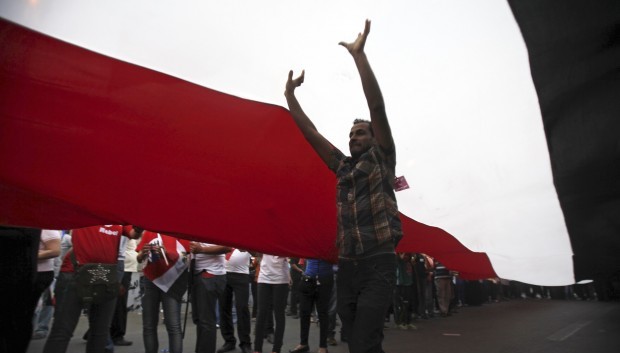Over the last two weeks, ordinary people and political elites, whether inside or outside Egypt, have wondered where the country is heading. However, the answer to this question remains ambiguous. The ever–changing nature of events on the ground ensures that nobody knows for certain. This has been the case since January 25, 2011. Nobody, including influential international powers, expected protests would be that massive or that the former regime would fall that easily. Political events continued to turn expectations, analyses and political predictions upside down.
The Egyptian middle class who ignited the spark of January 25 revolution returned to the streets after exactly one year after the country’s first elected president came to office. It is no secret that during this year the Muslim Brotherhood suffered a severe drop in popularity. Even those who call themselves “lemon squeezers” abandoned the Brotherhood. “Lemon squeezers” is an Egyptian expression meaning those who elected the Brotherhood’s presidential candidate not out of their liking for the Islamist organization or the ideology of its candidate, but rather out of dislike of the other candidates.
The small difference in votes between the two candidates who competed in the run-offs is a sign of the current state of polarization and division of Egyptian society. Over the last year, little has been done, particularly by the ruling authority—which is said to be represented by the Brotherhood’s executive office (known as the Guidance office)—to create a climate of agreement and public approval that would facilitate the transitional period.
Recently, the growing tension reached its breaking point, represented by a state of deadlock between the two camps which are unable to find a middle ground. Each camp wants to prove that it is more popular and that its supporters are more willing to remain for a long time in public squares; both camps seek to attract Egyptians sitting on the sidelines who prefer to call themselves the “couch party.”
Among the issues that have recently become a source of worry for those Egyptians who prefer to keep away from demonstrations are the problems affecting the economy and public services and the attacks against the judiciary. This is not to mention the errors committed in handling the country’s foreign policy and the deteriorating security situation in the country. Due to Egypt’s topography, internal stability has always been vital for maintaining security.
Belittling the size of the opposition or being overconfident of the number of supporters is a fatal mistake on the part of rulers. This is something which has become obvious after seeing the massive crowds marching through Cairo and other provinces in Egypt, and the resignation of four ministers (at time of writing). This is not to mention the several governors who either resigned or could not enter their headquarters. Besides this, the constant conflict between the regime and the state institutions such as the judiciary led to the atmosphere of confrontation in the country.
The military have issued a 48 hour ultimatum (expiring tomorrow) for the presidency to respond to the public’s needs. In fact, much of the public who previously demanded that the military intervene, approved of the statement that the General Command of the Armed Forces issued. On the other hand, there are the Brotherhood and the other Islamist trends, some of which threatened to resort to force, a thing which we hope all sides will avoid.
Everyone, particularly the rulers, should wisely admit that the transitional period has drawn to a close and that it will yield nothing in the light of the state of polarization. Therefore, the country needs a new road map to address the mistakes committed, such as holding elections before drafting a constitution, and work to include all sides in the country’s political process.
Besides this, the new road map should avoid compromising the country’s national identity by focusing on issues that do not concern or appeal to the public such as setting up an Islamic Caliphate. It should be acknowledged that the state institutions form the backbone of the government that should not be meddled with or undermined because such a step would violate the very principle of the state.
It is obvious that the next 48 hours will decisively determine the course of events in Egypt which nobody can predict. However, it is certain that this is a moment of change in the political scene and all sides should act responsibly. This is a moment of change and nobody should belittle the size of the crowds or misinterpret the public approval of the military’s statement. Besides, the public interest requires that everybody should participate in forming the country’s political future.
